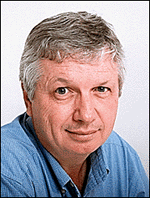


![]()
Talk Story
EXPLOITING Hawaii's location and natural resources has been our economic strategy since Hawaii's natural harbors became centers of seagoing commerce and established our principle cities. Hawaii needs more
than location to
diversify our economyWhere Hawaii's sugar and pineapple plantations once reaped the benefits of soil, water and climate, today hotels and golf courses -- tourism physical plant -- bedeck beaches and stretch out along craggy shores and lava fields. Remoteness, clear waters, balmy climate and tradition of hospitality made these islands magnets for visitors. They spawned the tourism industry to which we owe both past prosperity and present economic discomfort.
Tourism is a volatile business. We either need to find ways to deal with its ups and downs or develop new industries to backstop the economy and avoid its feast or famine.
Today the value of a mid-Pacific location is a recurring theme for political candidates proposing ways to diversify the economy. They often overlook the fact that Hawaii's mid-Pacific location is both bane and benefit. Natural advantages that work for Hawaii tourism don't work for other businesses.
Some see Hawaii as a vital meeting place and point to the East-West Center and the Asian Development Bank meetings last spring as models for exchanges and interactions bridging the two cultures. An empty Hawaii Convention Center is evidence this idea needs work.
Democratic gubernatorial candidate Andy Anderson says our economic fortunes are tied to our ability to attract businesses from China, Japan and other Asian countries. He sees Hawaii as the place for Asian companies to hold exhibitions and fairs to make deals with business people from the mainland and Europe.
As I discussed last week, the assumption that Hawaii's strategic location and high quality of life will attract high-tech businesses is flawed, according to Guy Kawasaki, an expert in high-tech business development. Kawasaki knows Hawaii well, having grown up here and graduated from Iolani School.
Kawasaki argues that a mid-way location doesn't help. Business people today communi- cate electronically and fly direct. While Hawaii's climate and quality of life are sublime, he says, "They are not compelling. Science is more important than climate."
Anderson also supports creating special enterprise zones in Hawaii that would attract high-tech businesses, engineers and computer programmers to relocate to the state.
Engineering and science research spawn high-tech businesses, Kawasaki says. Entrepreneurs with world-class business ideas come first, not venture capital funds or other supports, such as mid-ocean special enterprise zones. Without those seeds nothing will grow, no matter how fertile the field.
Linda Lingle, GOP candidate for governor, backs building a biomedical research facility and medical school. She envisions "a new biotechnology industry that will create better health care, train great doctors and create more jobs in a well-paid and expanding field."
Indeed, a biomedical research facility has enormous promise. However, erecting buildings is only a start. Science is about people and ideas, not buildings. Recruiting and retaining a nationally recognized faculty that will bring the best students and researchers to Hawaii will be key. That will cost money and require resolve.
Lingle's potential running mate, TV newsman Dalton Tanonaka, insists that "Asia-Pacific wants to do business with us." He says he "will pursue mainly the high-technology sector to develop industries and opportunities that are available."
Unfortunately, since Hawaii has few products besides sunshine, coffee and papayas, Asian countries must see us primarily as a market -- a market that has fallen on hard times.
Democratic candidate for governor Jeremy Harris says Hawaii has a pool of multilingual, multicultural workers who can help American businesses to expand into the Far East.
"We have people who can speak all the languages," he says.
Good for them, but how does this benefit the state economy as a whole?
Harris has a vision of Hawaii as a center for knowledge-based industries, which is based, again, on location: "We are situated to provide a place for businesses in Hawaii, the mainland and Asia," Harris says.
However, success in the market economy isn't about natural advantages like being in the middle, Kawasaki says. Instead, it's about revolutionary new ideas that give businesses an edge that can reap profits.
"Successful entrepreneurs aren't fair," he says. "They want to tilt the playing field. That's the power of Microsoft."
John Flanagan is the Star-Bulletin's contributing editor.
He can be reached at: jflanagan@starbulletin.com.